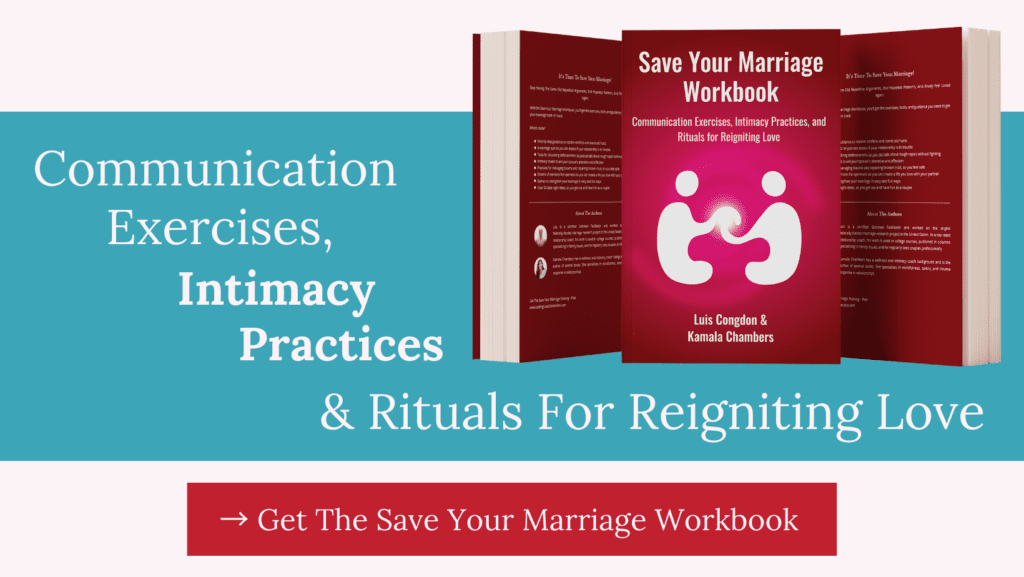Defensive listening in your relationships can be the difference between having a calm discussion and things escalating into an argument.
Getting defensive quickly twists any issue into a more significant problem.
Unfortunately, being a defensive listener could leave the other person feeling unheard or invalidated, creating a cycle of misunderstandings that will slowly damage your connection.
The good news, if you notice the moment you start showing signs you’re out of your window of tolerance, you can break the ugly cycle of defensiveness.
Also, listening from a place of love and understanding will help you find a deeper sense of intimacy, respect for each other’s perspective, and connection.
So let’s explore defensive listening examples and how you and your partner can stop this pattern together.
Table of Contents
What is defensive listening?

You can define defensive listening as “a communication behavior pattern where a partner feels the overwhelming need to defend themselves from the other partner.”
This defensive listening definition makes it clear that even if you and your partner hear each other’s words, you are unable to fully absorb what is said.
Instead, you are positioning yourself favorably vs. listening to understand another viewpoint.
For example, one partner shares how a comment hurt them. The defensive listener says the other person shouldn’t feel that way because of the nice things they’ve done for them.
Often, when someone reacts defensively, they’re not trying to act in a poor way. Instead, they’re defensive to protect themselves from feeling judged, guilty, or hurt – even if what was said was an innocent comment.
Related Reading: He Gets Defensive When I Tell Him How I Feel
What are some defensive listening examples?

Defensiveness and defensive listening can take many forms in conflict. For example, have you ever been in the middle of a discussion where the other person reacts defensively and uses twisted reasoning to make your simple comments seem more harmful than you intended?
Interrupting, blaming, and ignoring are other common examples of defensive listening.
Interrupting is defensive listening
One form of defensive talking is interrupting the speaker before they finish their thoughts. A defensive listener may try to take over the conversation or deflect attention away from their partner’s feelings.
As a result, it can be challenging to reach a resolution when only one person is allowed to talk and have their emotions be understood.
Denying responsibility

If your partner is defensive, they may deny responsibility for their actions and shift the blame onto others. For example, they may say, “It wasn’t my fault.”
Related Reading: My Husband Thinks He Does Nothing Wrong
Ignoring your partner
If you’re defensive listening, you may ignore what your partner is saying and stop listening – either by not paying attention or changing the subject. Instead, you may focus on your own emotions rather than listen to the other person’s standpoint.
Making assumptions is defensive listening
Defensive listeners may jump to conclusions or make assumptions about what the speaker is saying. They may react to your comments negatively and take things personally – even an innocent comment.
Using sarcasm or humor

If you feel defensive, you may use sarcasm or humor as a coping mechanism. For example, you may deflect the conversation by making light of the situation or using a sarcastic tone to convey your message.
Withdrawing is a defensive listening example
Defensive listening doesn’t just show through your words, but it involves your body language as well. This can include shutting down, emotional distance, turning away, emotional neglect, and crossing arms – all of which can create a barrier between you.
These defensive listening examples are often aspects of a toxic relationship. They can lead to frustration and discontentment.
Poor communication skills can create wrong impressions about the intentions behind the words. Therefore, creating a safe environment for each person to share an honest opinion and innocent comments without feeling a personal attack is essential.
What causes defensive listening?

Mostly, defensive listening is a subconscious choice.
Have you ever reacted without thinking about what you were doing or saying?
When people are defensive, it’s the same concept. They don’t choose to do it; they do it out of instinct.
This can happen because people have different communication styles. One partner might consistently feel attacked no matter how good the intentions are of the other person. They may even see criticism in every exchange, no matter how harmless or unintended.
Defensive listening might rear its head due to a build-up of resentment or doubt within your marriage.
In other cases, defensiveness can be a coping mechanism you might have learned from negative past experiences handling conflict.
Defensive listening could also be a sign of low self-esteem, with insecurity about yourself or your relationship potentially causing you to misconstrue statements as critical or negative when facing a perceived threat.
Maybe you’re afraid of being accused of being careless, so when your partner comes home and asks why you didn’t take the trash to the curb on trash day, you immediately get defensive.
You can better understand yourself and your partner by recognizing the underlying factors that prompt defensive listening.
What is active listening?

Active listening is a communication technique where the listener actively engages with the speaker to show they understand their message.
It involves giving full attention to the speaker, processing the information they share, and responding in a way that demonstrates comprehension.
Listening requires more than just hearing the words being spoken. It involves paying attention to the speaker’s tone of voice, body language, and other non-verbal cues.
It also requires the listener to ask clarifying questions, summarize what was said, and ask if they got it right.
Why is practicing active listening important?
To become a better communicator, strive to be a better listener.
It’s easy to fall into the trap of defensive listening when arguing with your partner, but with some practice, you end this relationship dynamic.
Listening can be a cornerstone of a healthy relationship. It fosters mutual appreciation, trust, and respect.
By actively listening, you can cultivate a deeper connection and discover the deeper needs in the relationship. In addition, listening shows that you care about them by validating their emotions and opinions.
You can gain greater insight into your partner’s thoughts and emotions by being a good listener, enabling them to express themselves freely.
Listening is a powerful way to express love and appreciation to your partner. Dedicating your attention without distractions, even if you disagree with their viewpoint, sends a message that you respect and value them.
Such recognition goes beyond mere words, and it helps couples remain emotionally connected.
Dig deeper into these communication skills. Take a marriage course. Try the Save Your Marriage Course.

How to practice active listening
As we covered earlier, this involves giving your full attention to the other person in conversation and responding to what they say instead of only listening to find ways to defend yourself.
Ask questions, provide feedback, and demonstrate that you are fully engaged in the conversation.
Also, try only to speak after they have finished their thought. It’s easier to respond to someone when you give them space to collect their own thoughts and what they are trying to communicate.
How do you listen to criticism without being defensive?

Hearing criticism without listening defensively can be challenging, but it’s an essential skill to develop to create a good relationship.
Stay calm
Try to remain calm and avoid reacting impulsively or emotionally. Take a deep breath, and remind yourself that the criticism is not a personal attack on you but rather an opportunity to improve and be a better partner to the one you love.
Listen with curiosity
Practice listening carefully to what the other person is saying without interrupting them. Try to understand their frame of mind and ask questions to clarify any points you don’t understand.
Don’t make excuses
Avoid making excuses or justifications for your behavior. Instead, respond in a way that acknowledges the criticism and takes responsibility for your actions.
Be empathetic
Show empathy and acknowledge the other person’s feelings, even if you disagree. Acknowledge their emotions and let them know you hear them. If you hurt them, validate their emotions and offer a sincere apology.

How can we avoid defensive listening?
Reflect on your partner’s thoughts and feelings and consider whether there may be some truth. If there is, use the feedback to make changes and improve.
Remember that listening to criticism without being defensive takes practice, and it’s okay to make mistakes along the way. However, you can’t go wrong when you approach criticism with an open mind and a willingness to learn and grow.
If we want to practice non-defensive listening, we need to recognize what triggers the need to react to innocent comments.
Couples therapy can be an excellent way to get to the root of this behavior, but these simple tactics can help you practice being a good listener. Want support? Book a complimentary couples consult.
Don’t interrupt
Interrupting your partner can be a defensive behavior that shuts down communication and make your partner feel disrespected. Instead, allow your partner to finish speaking before responding.
Validate their side

Even if you disagree with your partner’s perspective, recognize their feelings and point of view. Validating their thoughts and emotions will help them feel understood.
For example, next time they complain about their annoying coworker, try responding, “How frustrating! I can see that must be difficult to deal with”.
Ask for clarification
If you need clarification on what you’re hearing or what your partner is trying to communicate, ask about it. This can help prevent misunderstandings and ensure you are both on the same page.
Avoid blame

Blaming your partner can be a defensive behavior that can escalate the conflict. Instead, focus on expressing your emotions and viewpoint rather than blaming your partner.
By practicing these strategies, you can improve communication and conflict resolution in your relationship.
How can I improve poor listening skills?
Here are some ways you can improve your listening skills when communicating.
Related Reading: Communication Exercises

Remove distractions
When talking with your partner, try to remove any distractions that may take away from your listening ability. This includes turning off your phone or TV and finding a quiet space to talk.
Use non-verbal cues
When you make eye contact, nod, or hold hands, you can show the speaker you are listening and engaged in the conversation.
Repeat what they said back to them
A great way to ensure you understood your partner’s message correctly is to repeat the words you heard and allow them to give you feedback on whether you understood their message correctly or not.
If you understood correctly, you have the green light to respond to their thoughts. However, if they express that you didn’t grasp it, allow them to try explaining again.
Be open-minded

Keep an open mind when listening to your partner’s point of view, even if it differs from yours. This will help foster appreciation and respect in your relationship.
Feeling defensive can make communication harder when you have a conflict with another person.
By learning from your past experiences and granting yourself time and patience, you can stop defensive habits and become a better listener.
Learn to be a better listener to your partner
Being a better listener can improve your love life drastically.
One trait of excellent listening skills is allowing the speaker to express while you listen from a place of love.
In the same way, lowering your defenses while communicating can make every area of your life better. Because the ability to resolve conflict and put others at ease will deepen all your relationships.
Pick up the Save Your Marriage Workbook to learn how to be a better listener in your relationship.







0 Comments